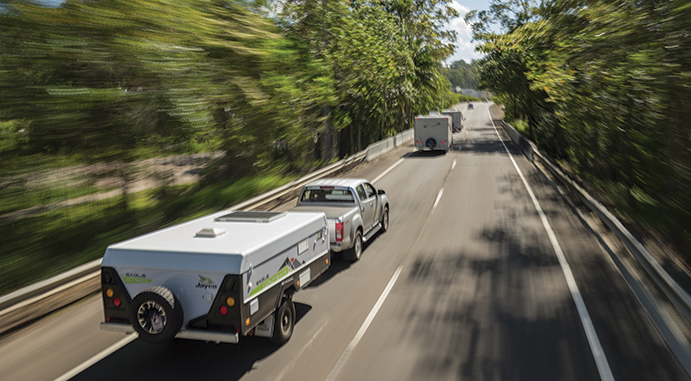Exploring the great outdoors through caravanning and camping offers so many health benefits, but for travellers with diabetes there are some extra considerations when it comes to staying healthy on the road, writes Caravan Industry Association of Australia’s Rachael Morris.
Caravanning and camping with diabetes
As we get a little older, we need to be more aware of the risk factors around developing diabetes as well as what you can do once you’ve been diagnosed with the condition. Diabetes is the name given to a group of different conditions where there is too much glucose in the blood. There are two main types of diabetes. Type 1 is less common and usually affects children and young adults, but it can occur at any age. Type 2 is a lifestyle disease affecting 85 to 90 percent of all people with diabetes. Because Type 2 diabetes is a lifestyle disease, it is strongly associated with high blood pressure, abnormal blood fats and the classic ‘apple shape’ body where there is extra weight around the middle. The good news is that there are lots of simple changes you can make in your lifestyle that will help with both the prevention and management of this type of diabetes.
Lifestyle factors you can control
There are plenty of positive changes you can make to your lifestyle to ensure the best health possible, whether you’re aiming to prevent diabetes or are currently managing it. Here are the main ones:
- Aim for good levels of physical activity
- Focus on healthy eating
- Keep your weight within the healthy range
- Avoid smoking
- Maintain good blood pressure
- Control your cholesterol levels
The great thing is that the caravanning and camping lifestyle is perfect for increasing your physical activity. As you’re travelling around, be sure to enjoy the sights by taking plenty of walks and short hikes. It’s a great way to get the most out of your trip at the same time as looking after your health. And travelling on the road doesn’t mean healthy eating needs to go out the window either.
Eating healthy on the road
Healthy eating for diabetes has a lot to do with controlling sugars and opting for low GI foods. One way to do this is to keep your meals simple and focus on whole foods over processed. This is another instance where the old school way is best – lean meat and three veg is a good dinner option. But what about snacks on the road and take away meals?
Try these tips for healthier options on the road:
Burger and sandwiches – ask for extra salad and wholegrain bread. Hold the butter and mayo and only choose meat or cheese or egg (not all three!). Try to avoid bacon and fatty meats.
Pizza – Opt for the thin base instead of a thick pan base. Add lots of veggie based toppings and limit the high fat ones like cheese and deli meats.
Chicken – Go for barbequed or grilled chicken instead of crumbed or fried. Avoid the skin and limit your gravy (if you can!). Go for sides like salads and veg rather than hot chips.
Fish and Chips – Order your fish grilled instead of fried (you knew that was coming!). Enjoy your chips but see if you can get a small serve of thick cut rather than French fries.
Loaded spuds – Eat the skin and aim for the lower fat toppings such as salads, veggies, baked beans and lower fat cheeses like ricotta. Go easy on the high fat toppings like butter, regular cheese, sour cream and bacon.
Healthy snacks to keep handy:
- Fresh fruit is always an option.
- Veggie sticks with hummus or low fat cream cheese.
- Plain unsalted nuts.
- Raisin toast.
- Low fat yoghurt.
Eating healthy on the road is just as easy as eating healthy at home, and has more to do with being prepared and knowing the healthier options than anything else.
Diabetes and road tripping
 If you are a driver with diabetes, extra precautions need to be taken to help maximise road safety. If you have or develop diabetes you must inform the Driver Licensing Authorities in your state or territory. Each state has their own requirements around showing medical certificates periodically, depending on how your diabetes is managed. If you are required to notify the authorities but don’t, you run the risk of being charged with driving offences if you have a driving accident. It is also advisable to inform your motor vehicle insurer to avoid problems with insurance claims.
If you are a driver with diabetes, extra precautions need to be taken to help maximise road safety. If you have or develop diabetes you must inform the Driver Licensing Authorities in your state or territory. Each state has their own requirements around showing medical certificates periodically, depending on how your diabetes is managed. If you are required to notify the authorities but don’t, you run the risk of being charged with driving offences if you have a driving accident. It is also advisable to inform your motor vehicle insurer to avoid problems with insurance claims.
The main driving hazard for people who take insulin or glucose lowering medications is the unexpected occurrence of hypoglycaemia (hypo), but most episodes can be prevented. Precautions to take:
- Test your blood glucose and ensure it is above 5 mmol/L before driving.
- Make sure your blood glucose is above 5 every 2 hours during driving.
- Always carry a fast acting carbohydrate food (or drink) with you in the vehicle.
- Hypoglycaemia can impair your ability to drive safely. If you feel your blood glucose level is low, be sure to pull over immediately and stop your car.
Travelling is a great way to stay active and you can easily maintain a healthy lifestyle on the road. In fact, caravanning is all about a great lifestyle – getting out in nature, connecting with people and making the most of our free time. And the better your health, the better your travels.
ABOUT
Caravan Industry Association of Australia is a charity partner of Diabetes Australia. Visit the Diabetes Australia website (www.diabetesaustralia.com.au) for more resources, including the free eBook Healthy Eating: A guide for older people living with diabetes and information booklet Diabetes and Driving.
Join the Let’s Go Caravan & Camping VIP Club
For ideas on where to go, why not check out letsgocaravanandcamping.com.au, a website full of information on where to go and where to stay while you’re there. You can also download the free eBook 99 Experiences, which includes unique and fun things to do while on the open road across Australia.






















Add Comment